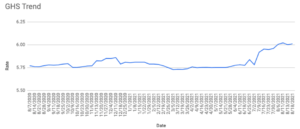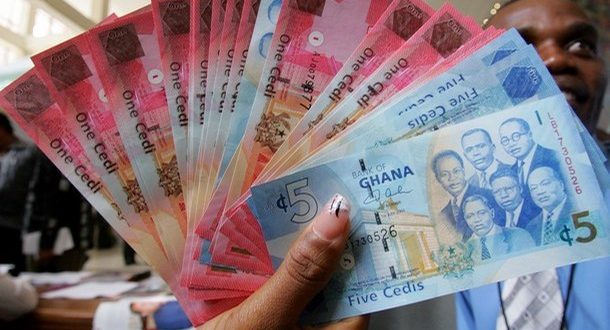The Cedi continued to trade above 6 to the dollar, weakening to 6.01 from 6.005 at last week’s close as liquidity conditions remain tight. Some analysts are projecting that Ghana’s economy will expand by 8.9% in the second quarter of 2021 compared to the same period in 2020, boosted by increased international trade and demand for its agricultural and other export commodities, which are estimated to have grown by 18%.

Meantime, the World Bank has warned Ghana about its rising domestic and external debt stock, which currently stands at 76.6% of the country’s GDP. We expect to see sustained pressure on the Cedi in the coming days given the ongoing liquidity constraints.
New Zambian President HH brightens post-default outlook
Zambia’s opposition leader Hakainde Hichilema won the country’s presidential election against incumbent Edgar Lungu, clinching victory by around one million votes. It was the Zambian businessman’s sixth attempt at winning the presidency and comes at a time of increased discontent with the previous regime as the cost of living rises.
The Zambian Kwacha had depreciated 21% to a low of 22.67 to the dollar in July from 18.65 in August last year, with the country defaulting on its debt in November. However, optimism over Hichilema’s victory has seen the currency begin to reverse its losses, strengthening to 19.17 to the dollar on Wednesday.
Zambia’s Eurobonds have also gained since Lungu conceded the election on Monday. HH, as the new president is popularly known, has pledged to revive the economy through mass production of electric car batteries among other policies.
Inflation drop helps steady Naira
The Naira held firm against the dollar this week, unchanged at 515 on the parallel market and broadly in line with last week’s close on the official NAFEX window, trading at 411.50 compared to 411.49 last Friday.
The currency was supported by Nigeria’s inflation rates falling for a fourth consecutive month, helping to ease the ongoing pressure on the Naira from lower crude sales as the pandemic weakens global oil demand.
The country’s consumer price index dropped to 17.38% in July from 17.75% in June, while the composite food index declined to 21.03% in July from 21.83% the previous month. Given the improving inflation outlook, we expect the Naira to remain stable in the coming days.
Global risk-off trend takes toll on Rand
The Rand depreciated to 14.93 against the dollar from 14.72 at last week’s close amid a broader pull back from riskier assets as investors fret about the rapidly spreading Covid-19 Delta variant, disappointing Chinese economic data and the collapse of Afghanistan’s government. At home, South African inflation edged lower in July to 4.6% from 4.9% in June, hovering within the South African Reserve Bank’s inflation target range of 3% to 6%. We project the Rand will remain under pressure in coming days given weaker global risk appetite, which is giving support to haven assets.
Remittance inflows support Egyptian Pound
The Pound was trading broadly flat at 15.71 to the dollar this week, compared to 15.70 at last week’s close as remittances helped offset the impacts of Covid-19, which have crimped foreign currency inflows from sectors such as tourism. The Central Bank of Egypt said that remittances increased 13% to $28.5bn between July last year and May 2021. Foreign investments into the country also increased by 47% in the third quarter of the 2020/21 fiscal year, according to the CEO of the General Authority for Investment and Free Zones. We expect continued remittance inflows and foreign investment to keep the Pound stable in the week ahead.
Kenya’s FX reserves take hit amid Shilling pressure
The Shilling depreciated further this week, sliding to 109.55 to the dollar from 109.30 at last week’s close as increased dollar demand from merchant traders and the manufacturing sector outpaced inflows from agricultural exports. The recent pressure on the Shilling has led to a fall in Kenya’s foreign exchange reserves, declining to just under $9.3bn from $9.35bn a week earlier. We expect the Shilling to be under pressure over the coming seven days as importer dollar demand by manufacturing sector picks up in the next half of the month.
Dairy exports help keep Ugandan Shilling steady
The Shilling was unchanged against the dollar this week, trading at 3525/3535 amid reduced dollar demand from importers that would usually put pressure on the currency. The Shilling was also supported by an increase in exports from the agricultural sector, particularly dairy products. Uganda’s Dairy Development Authority said dairy exports nearly doubled in the 2020/21 fiscal year compared to 2019/20, contributing to 42% of the country’s total agricultural exports. We expect dollar demand to remain subdued, which should keep the Shilling stable over the coming week.
World Bank to finance Tanzanian education infrastructure
The Shilling was little changed in trading this week, fetching 2314/2324 to the dollar as the World Bank agreed to pump $425m into the country to finance the development of public universities and higher education institutions. Tanzania’s economy grew by 4.9% in the quarter ending June, lifted by agriculture, construction, transportation, manufacturing and mining. We expect the Shilling to remain steady over the next seven days as dollar demand from importers is matched by inflows from the energy and manufacturing sectors, as well as from investors. A new online system is to speed up access to the country’s Certificate of Incentives, which entitle holders to various investment incentives, potentially boosting inflows into the country.










